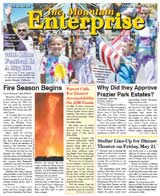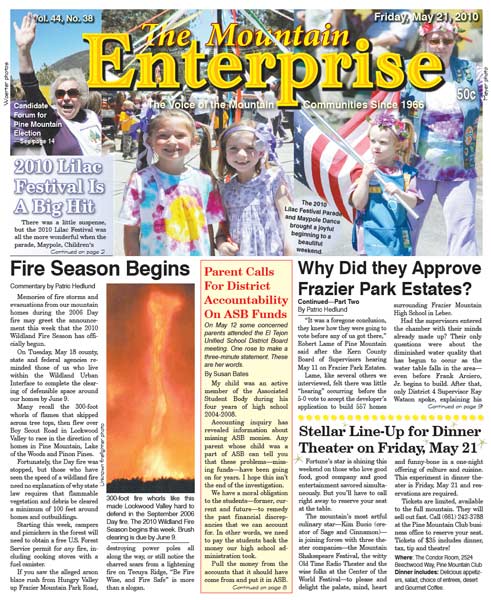Continued—Part Two [Read Part One] By Patric Hedlund
“It was a foregone conclusion, they knew how they were going to vote before any of us got there,” Robert Lame of Pine Mountain said after the Kern County Board of Supervisors hearing May 11 on Frazier Park Estates.
Lame, like several others we interviewed, felt there was little “hearing” occurring before the 5-0 vote to accept the developer’s application to build 557 homes surrounding Frazier Mountain High School in Lebec.
Had the supervisors entered the chamber with their minds already made up? Their only questions were about the diminished water quality that has begun to occur as the water table falls in the area— even before Frank Arciero, Jr. begins to build. After that, only District 4 Supervisor Ray Watson spoke, explaining his thoughts on several points.
This is a summary of Watson’s comments, from rapid notes that were taken on a computer at the hearing. It is not a transcript of a recording, but we will carry his comments here in quotes, to clarify that this was his statement before calling for the vote.
Watson began by saying that “We’ve heard a lot of testimony. We have gone through the legal and technical aspects of this and the information we have gotten is that the project is complying with CEQA (the California Environmental Quality Act).
“Nothing will be built until the water is delivered. The water available in that basin is between 2,000 to 4,000 acre feet a year. This development will use 500 acre feet a year.
“Has the applicant proven the ability to get the water out? He has a 200 gallon per minute well. That would serve a part of the development. But they will have to prove they can provide for the entire development before they can go forward with building.”
Watson asked for confirmation on this point from newly promoted Kern County Director of Planning Lorelei Oviatt. She said, “that is correct.”
“Traffic is another issue. At some times of the day and week the service level at that area is already ‘F.’ This proposal is to improve the level of service. Some people have asked if the roundabouts are proven. Caltrans will determine what specific improvements are to be made. If Caltrans thinks roundabouts are best, then they will do those. If Caltrans wants something else, they will do that.
“Air Quality is another issue. The highest mitigation has been imposed on this community to minimize pollution.”
Watson appeared to be referring to pollution caused during the building process.
“As to commuting, no matter where someone lives, it will be an issue. It is the diesel trucks that are the source of the pollution in this region. The cars we are driving are cleaner; if diesel truck standards are improved, the air will be cleaner… People who live in Pine Mountain and drive to Costco—what are they doing to the air?
“Here is a project that is on property adjacent to the Interstate 5. You don’t have people driving excessive distances [just to get to the freeway]. They will be driving less than the people [already] living there.”
Regarding the fact that Arciero purchased land in the San Andreas Fault zone on which to build the development, Watson said that setbacks “are higher now than required by building standards of the moment.”
What about concerns regarding the viewshed impact, with Fallingstar Homes altering the rugged ridge line that currently serves as the gateway to the Mountain Communities?
“The view of most of it will be out of sight from I-5 and from Frazier Mountain Park Road,” Watson said.
As he spoke these words, a groan went up in the supervisors’ chambers, coming (it seemed) involuntarily from the throats of several of the Mountain Community residents listening.
Watson continued, “People want to preserve their rural atmosphere. At the last meeting I asked for a show of the map, showing that most of Tejon Ranch is committed to a preserve; Wind Wolves is a preserve; you have national forest land that will never be developed in that area….The rural nature of the area will be preserved, maybe not right next door to you, but it will be there.”
The supervisor continued, apparently referring to the board of supervisors’ view of the Frazier Park/Lebec Specific Plan, which is considered so important to many residents of the mountain region. “This development is 800 acres, and 60 percent of it will be open space…there will be open access to trails and the high school will have access to it.
“We haven’t talked about the issue of how communities should be developed,” Watson said. “You cannot impose the conditions on a smaller development area that you can impose on a planned community—the parks, the playing fields water recycling, the water sewage treatment systems—we can’t impose these conditions on smaller developers.” And then his comments turned a bit personal.
Continued next week
This is part of the May 21, 2010 online edition of The Mountain Enterprise.
Have an opinion on this matter? We'd like to hear from you.


